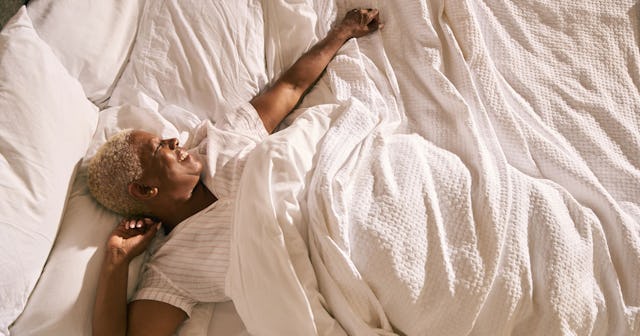Waking Earlier May Help Cut Our Depression Risk By A Lot

I often have trouble falling asleep. In fact, most nights I toss and turn, my mind overthinking or worrying or just plain ol’ too tired to settle down for the night. I’ve always been a morning person. I’d wake up with the sun or the birds, whichever I heard or saw first. I thrive in the morning; it’s when I get the most done. As someone who is diagnosed with anxiety and mild depression, and someone who takes medication for both, learning about how waking up earlier in the morning can help cut my depression risks, I felt a sense of relief. Though I currently take medication for my mental health, I’ll continue to wake up early if it helps me — and science shows that it very well might.
A recent study conducted by MIT, Harvard, and the University of Colorado Boulder, provides us with an idea of how getting more sleep combined with waking up earlier can improve our mental health. The study is a first of its kind. With the 840,000 participants, researchers found that waking up earlier alone could reduce the risk of people experiencing major depression. And getting more sleep could make the effect even stronger; as reported in the Science Daily, research from the study suggests, “if someone who normally goes to bed at 1 a.m. goes to bed at midnight instead and sleeps the same duration, they could cut their risk by 23%; if they go to bed at 11 p.m., they could cut it by about 40%.”
However, especially for those who consider themselves night owls, it isn’t always easy to go to bed earlier in an effort to help lower their depression risk. Iyas Daghlas, M.D., a Harvard graduate, states, “We live in a society that is designed for morning people, and evening people often feel as if they are in a constant state of misalignment with that societal clock.”
One researcher of the study gives really good advice that we can all take to heart — especially the night owls. The study’s senior author, Céline Vetter, says, “Keep your days bright and your nights dark. … Have your morning coffee on the porch. Walk or ride your bike to work if you can, and dim those electronics in the evening.”
In the United States, major depressive disorder affects mostly women, but it affects men as well. It is the leading mental health issue among people ages 15-44 and generally is diagnosed in a person at the age of 32, according to the Anxiety and Depression Association of America. To make matters worse, the pandemic has uncovered so much for people, some who decided they weren’t in the right marriage and decided to divorce — while others lost jobs, or loved ones, or the weight of the isolation during the pandemic simply became too much to bear.
With the continued stressors of the pandemic — from remote learning to working from home to deciding whether or not to commute back into work to summer camp to marriage — it’s all a shitload of burdens to carry on top of just the everyday ups and downs of life. Now that summer is almost here and most people are getting vaccinated, give yourself an additional dose of medicine — get out in nature, absorb some sun, and go to bed a little earlier to help cut down your risk of depression.
There are also other things you can start doing today to help increase your mental health naturally. A CNN report outlines some of these things in addition to getting more sleep: set a bedtime/daily routine, avoid caffeine and nicotine, keep your room dark, be mindful of the temperature in your room, take mindful deep breaths, do yoga or tai chi or qi gong to release your endorphins, and meditate. Something that has also worked for me is to surround myself with people and a community of people who make me feel good — friends and family can be the perfect medicine too.
No one is immune from the possibility of feeling low or from the possibility of being diagnosed with depression. With kids and work and lack of me time, it can be a challenge to prioritize going to bed at a more reasonable time. But as science shows, in order to manage depression, it takes putting yourself first. Even — especially — at bedtime.
This article was originally published on